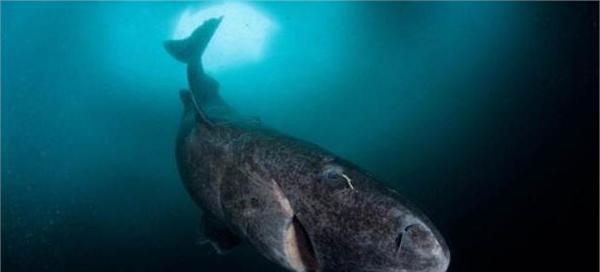10. The world's longest-lived vertebrate animal , the Greenland shark. The shark lives in the icy deep seas of the North Atlantic and has a lifespan of at least 272 years, and may even live to be 500 years old.

9. Extremely rare white giraffe. Is there anything more eye-catching than a rare white giraffe? It was spotted in Tanzania's Tarangire National Park in January.
8. Cats that can ski. In March, a video for National Geographic showed Norway's famous "ski cat" doing cross-country skiing in the snowy wilderness.
7. Caterpillars that use butt drums to attract friends. A swarm of masked birch caterpillars of the larvae of the double-lined hook moth is lying on a leaf, probably chatting through vibrations. Scientists have long known that this caterpillar rubs the bristles of its tail against the leaves, creating vibrations.
6. Disco spider whose body color changes with pulse. This common spider in Singapore has something similar to a pulse in its body that scientists can't figure out. Scientists don't know how the guano spider produces this kind of internal peristalsis, let alone what its purpose is.
5. The constant emergence of two-headed sharks. Most two-headed sharks are born and die. Two-headed sharks sound like fictional monsters from movies, but they do exist, and more and more are appearing around the world.
4. This animal's urine smells like butter popcorn. Binturong, not a bear or a cat, is a mammal in Southeast Asia whose urine is reminiscent of a movie theater.
3. Arctic fox that can plant flowers. Arctic foxes can give birth to 10 or even 16 cubs in a nest. So many little foxes produce many nutrients in and around their underground nests, such as feces and food residues. These organics feed lush dune grasses, rhombus willows and yellow wildflowers, which are particularly bright on gray landscapes.
2. Leaves like spiders. Native to southwestern China, this spider was the first spider to be found to mimic leaves.
1. The first deep-sea ghost shark photographed. A rare shark appeared in a video released in December, which scientists believe is the deep-sea ghost shark, and it is the first time that the ghost shark has been recorded on camera. Previously, scientists thought the ghost shark only existed in the southern hemisphere, but this time it was also found in California. Unlike some common sharks, deep-sea ghost sharks do not have sharp teeth, but use mineralized gum beds to vigorously chew on mollusks, worms and other seabed animals.